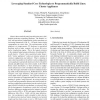Free Online Productivity Tools
i2Speak
i2Symbol
i2OCR
iTex2Img
iWeb2Print
iWeb2Shot
i2Type
iPdf2Split
iPdf2Merge
i2Bopomofo
i2Arabic
i2Style
i2Image
i2PDF
iLatex2Rtf
Sci2ools
103
click to vote
CLUSTER
2002
IEEE
2002
IEEE
Leveraging Standard Core Technologies to Programmatically Build Linux Cluster Appliances
Clusters have made the jump from lab prototypes to fullfledged production computing platforms. The number, variety, and specialized configurations of these machines are increasing dramatically with 32 – 128 node clusters being commonplace in science labs. The evolving nature of the platform is to target generic PC hardware to specialized functions such as login, compute, web server, file server, and a visualization engine. This is the logical extension to the standard login/compute dichotomy of traditional Beowulf clusters. Clearly, these specialized nodes (henceforth “cluster appliances”) share an immense amount of common configuration and software. What is lacking in many clustering toolkits is the ability to share configuration across appliances and specific hardware (where it should be shared) and differentiate only where needed. In the NPACI Rocks cluster distribution, we have developed a configuration infrastructure with well-defined inheritance properties that lev...
CLUSTER 2002 | Cluster Appliances | Distributed And Parallel Computing | Hardware Differences | Traditional Beowulf Clusters |
| Added | 14 Jul 2010 |
| Updated | 14 Jul 2010 |
| Type | Conference |
| Year | 2002 |
| Where | CLUSTER |
| Authors | Mason J. Katz, Philip M. Papadopoulos, Greg Bruno |
Comments (0)

